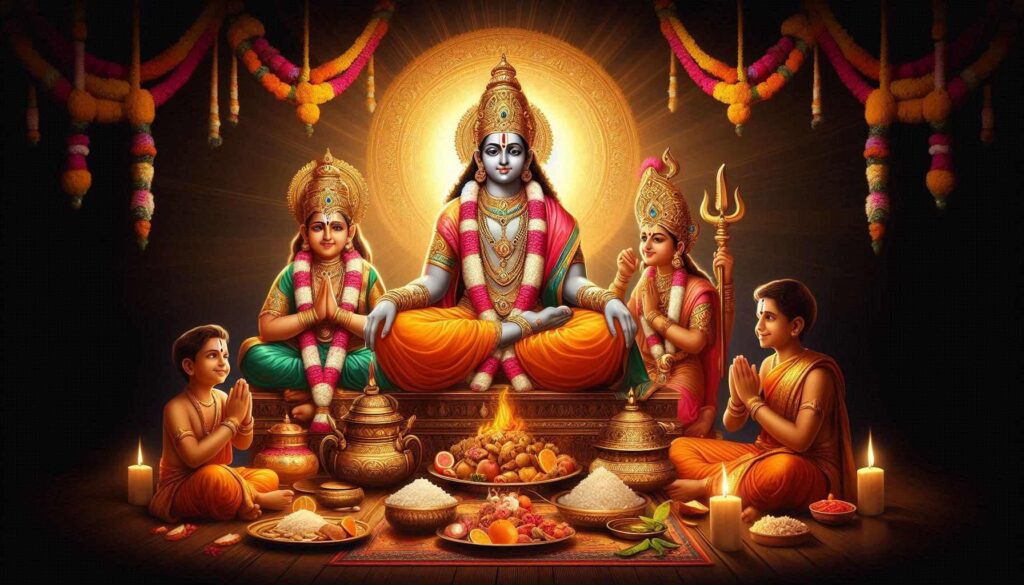Festivals in West Bengal in December 2025
In December, West Bengal experiences a blend of rich cultural celebrations and religious festivals that reflect the state’s diverse spiritual landscape. From Christian celebrations like to Hindu observances like Gita Jayanti and Santan Ekadashi, this month is a time for reflection, devotion, and community bonding. In this article, we explore the key festivals of December 2025 in West Bengal, highlighting their cultural significance, rituals, and unique traditions.
Read More About Hindu Philosophy
1. Gita Jayanti – Commemorating the Divine Wisdom of the Bhagavad Gita

Date: December 5, 2025
Gita Jayanti, the celebration of the birth of the Bhagavad Gita, is an important religious observance in Hinduism, particularly for those following the Vaishnavism tradition. It is believed that on this day, Lord Krishna imparted the teachings of the Gita to Arjuna on the battlefield of Kurukshetra.
Rituals and Traditions:
- Recitation of the Bhagavad Gita: Devotees gather in temples and homes to recite the verses of the Bhagavad Gita. This is often done in the early morning hours, with the chanting of mantras and prayers to Lord Krishna.
- Special Pujas: Many temples in West Bengal, especially those dedicated to Lord Krishna, perform pujas and offer special prayers on Gita Jayanti. The day may also feature discourses by spiritual leaders discussing the wisdom of the Gita and its relevance to contemporary life.
- Community Gatherings: In some communities, there are processions, where devotees chant the Gita’s verses, while others gather for spiritual discussions or perform charitable activities.
Cultural Significance:
Gita Jayanti serves as a reminder of the eternal wisdom of the Bhagavad Gita. The teachings of the Gita, which emphasize duty, devotion, and spiritual knowledge, are deeply influential in Bengali culture. It is a day to honor the philosophical and spiritual depth of Hinduism and reflect on the moral and ethical teachings of Lord Krishna.
2. Santan Ekadashi – Fasting and Devotion for the Blessing of Children

Date: December 15, 2025
Santan Ekadashi is observed on the Ekadashi (11th day) of the Krishna Paksha (waning phase of the moon) in Margashirsha month, which falls in December. This fasting day is significant for couples desiring children, as it is believed that observing a strict fast on this day invokes divine blessings.
Rituals and Traditions:
- Fasting and Worship: Devotees observe a fast from food and water, dedicating the day to worshiping Lord Vishnu. The fast is accompanied by prayers, which are said to invoke the blessings of Lord Vishnu for progeny and family welfare.
- Recitation of Vishnu Stotras: Devotees often recite sacred texts like Vishnu Sahasranama (the 1000 names of Lord Vishnu) and other hymns dedicated to Lord Vishnu and Lord Krishna.
- Puja and Charity: In temples, special pujas are conducted, and devotees make offerings of fruits, flowers, and sweets to Lord Vishnu. It is also common to donate food and clothing to the needy as a form of charity.
Cultural Importance:
Santan Ekadashi holds significant cultural value for married couples, especially those seeking divine blessings for a child. The ritual symbolizes the belief in divine grace and emphasizes the importance of faith, purity, and devotion in achieving one’s desires.
3. Hanuman Jayanti – Honoring the Devotion and Strength of Lord Hanuman

Date: December 27, 2025
Hanuman Jayanti, the birth anniversary of Lord Hanuman, is another important festival celebrated in December. Lord Hanuman, known for his immense strength, devotion to Lord Rama, and courage, is widely revered in West Bengal, particularly among the Bengali Hindus.
Rituals and Traditions:
- Recitation of Hanuman Chalisa: Devotees recite the Hanuman Chalisa (a 40-verse devotional hymn) to seek Lord Hanuman’s blessings for strength, courage, and protection.
- Temple Celebrations: In temples dedicated to Lord Hanuman, special prayers and bhajans (devotional songs) are sung in the morning. The idol of Hanuman is often decorated with flowers, garlands, and sweets.
- Community Worship: Large processions take place in some areas, with devotees chanting the name of Lord Hanuman, distributing prasad, and participating in cultural performances.
Cultural Significance:
Hanuman Jayanti is a day to celebrate devotion, strength, and loyalty. The festival encourages the worship of Lord Hanuman, who embodies selfless service and fearlessness, and it is a time for devotees to reaffirm their own faith and devotion.
4. New Year’s Eve – Welcoming the New Year with Joy and Hope
Date: December 31, 2025
While New Year’s Eve is not a religious festival, it is widely celebrated across West Bengal with great enthusiasm. People of all faiths come together to bid farewell to the old year and welcome the new one with joy, optimism, and reflection.
Rituals and Traditions:
- Parties and Gatherings: As midnight approaches, families and friends gather for parties, concerts, and community events. The atmosphere is filled with music, dancing, and fireworks.
- Feasts and Celebrations: Traditional Bengali dishes, sweets, and drinks are served, and people celebrate with fervor, often sharing meals with loved ones and neighbors.
- Midnight Celebrations: At the stroke of midnight, fireworks light up the sky, and people exchange wishes for a prosperous New Year. Some also participate in religious observances or prayers at temples, seeking blessings for the coming year.
Cultural Significance:
New Year’s Eve in West Bengal represents a time of renewal and hope. It is a celebration of life and togetherness, where people reflect on the past year and look forward to new beginnings. The festive spirit transcends religious boundaries, uniting people in joy and optimism.


